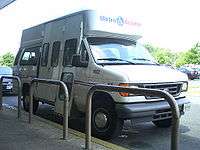MetroAccess
 | |
| Parent | Washington Metro |
|---|---|
| Founded | May 16, 1994 |
| Headquarters | 600 Fifth Street NW, Washington, D.C., U.S. 20001 |
| Service area | Washington metropolitan area |
| Destinations | Transit Zone |
| Website |
www |
MetroAccess is a shared ride public transportation service for individuals in the Washington DC Metropolitan Area who are unable to use fixed-route public transit due to disability. "Shared ride" means that multiple passengers may ride together in the same vehicle.
Region covered

The service provides daily trips throughout the Transit Zone in the Washington Metropolitan region. The Transit Zone consists of the District of Columbia, the Maryland counties of Montgomery County and Prince George's County, the Virginia counties of Arlington County and Fairfax County, and the cities of Alexandria, Fairfax and Falls Church. Rides are offered in the same service areas and during the same hours of operation as Metrorail and Metrobus. The service is provided by the Washington Metropolitan Area Transit Authority (Metro), and is the region's complementary paratransit service offered in accordance with the Americans with Disabilities Act (ADA).[1] MetroAccess began operation in May 1994, and since then, annual ridership has grown from 200,000 to over 2.4 million passengers.
MetroAccess operates 365 days a year, providing door-to-door, shared rides reserved from one to seven days in advance. Its fares are two times the fastest comparable fixed-route fare, with a maximum fare of $6.50. Customers are required to pay the fare to the driver in cash prior to boarding the vehicle or by using Metro's EZ-Pay Program, the trip origin and destination must be within 3/4 mile of fixed-route service (a bus stop or rail station).[1] MetroAccess service hours and locations coincide with those of Metro's bus and rail services, with the exception of express routes such as those serving Dulles International Airport.
Eligibility for paratransit service is defined in the ADA as being based on an individual's "inability to use public transit" due to a disability, and in some cases, this inability is a result of either accessible services not being offered at the desired time of travel or the absence of an accessible pathway to a nearby bus stop or rail station. Eligibility determinations are made by MetroAccess' Office of Eligibility.
WMATA has worked to encourage and facilitate the use of fixed-route transit by its customers with disabilities. For MetroAccess customers who have an occasional or conditional ability to use existing fixed-route public transit, WMATA offers its fixed-route services free of charge. This incentive decreases demand for the more costly paratransit service by shifting disabled customers to existing bus and rail service according to customer choice and ability. Those who do not have an inability to use public transit but who do have a qualifying disability may be eligible for Metro's reduced (half) fare Disability ID card. MetroAccess service is provided by a primary contractor-broker with multiple subcontractors and taxicab providers. It is now the fourth largest paratransit service in the United States with a fleet of over 650 vehicles and well over 1,000 employees.
References
- ↑ MetroAccess Customer Guide http://www.wmata.com/accessibility/metroaccess_service/customer_guide.cfm#what